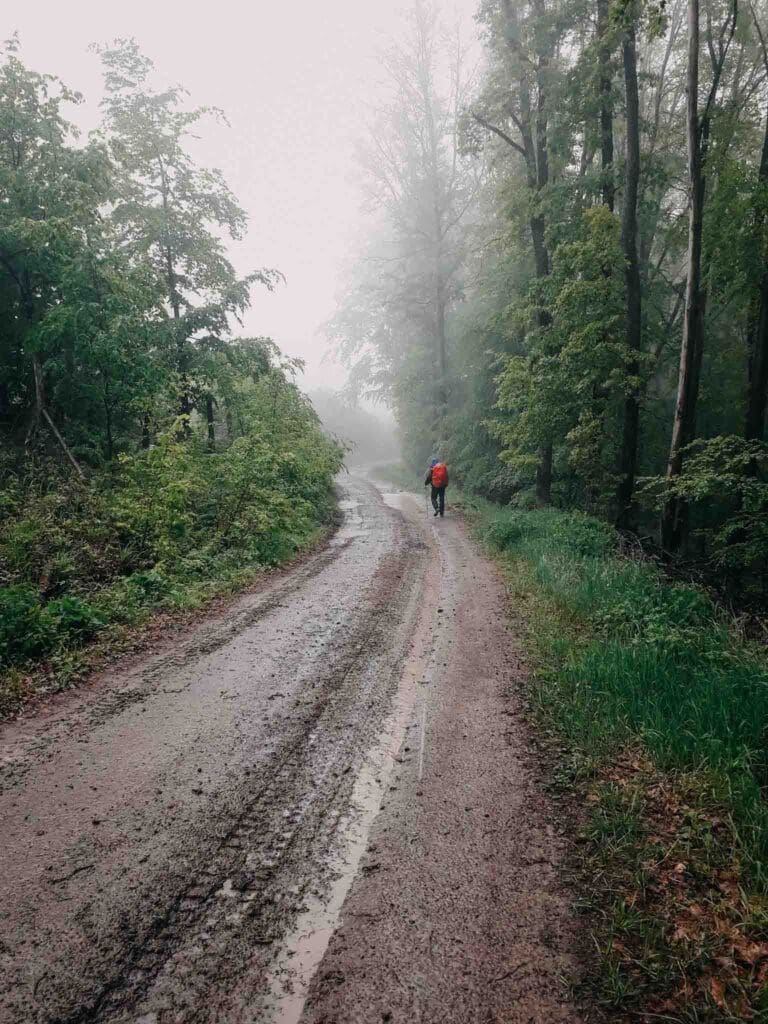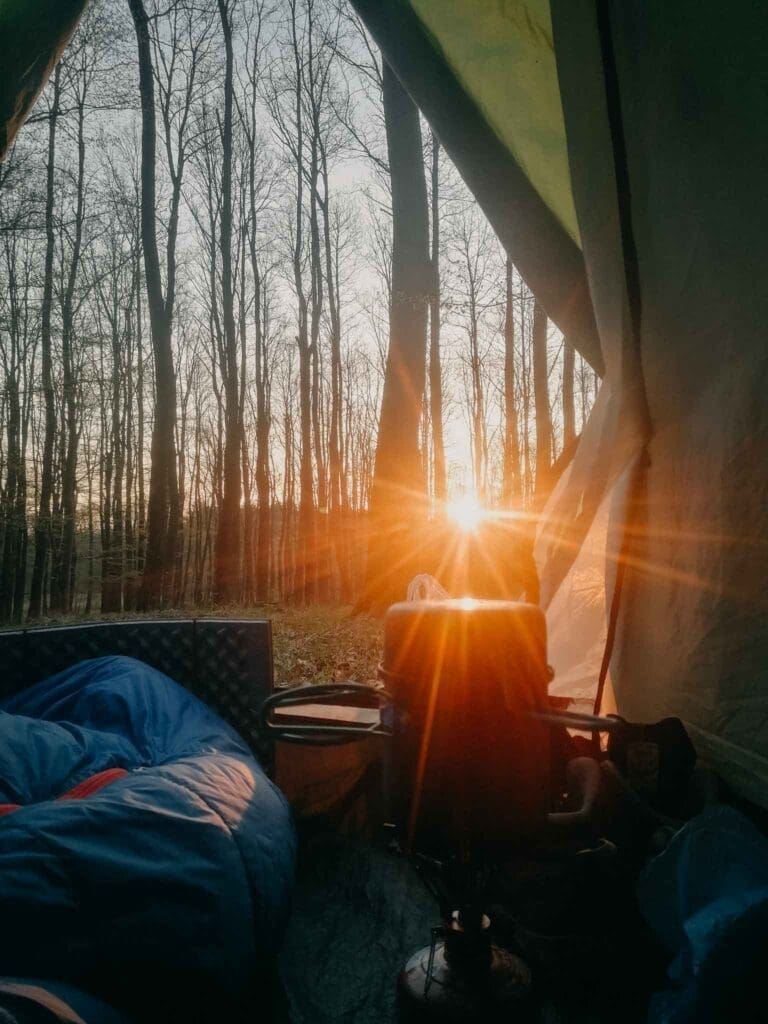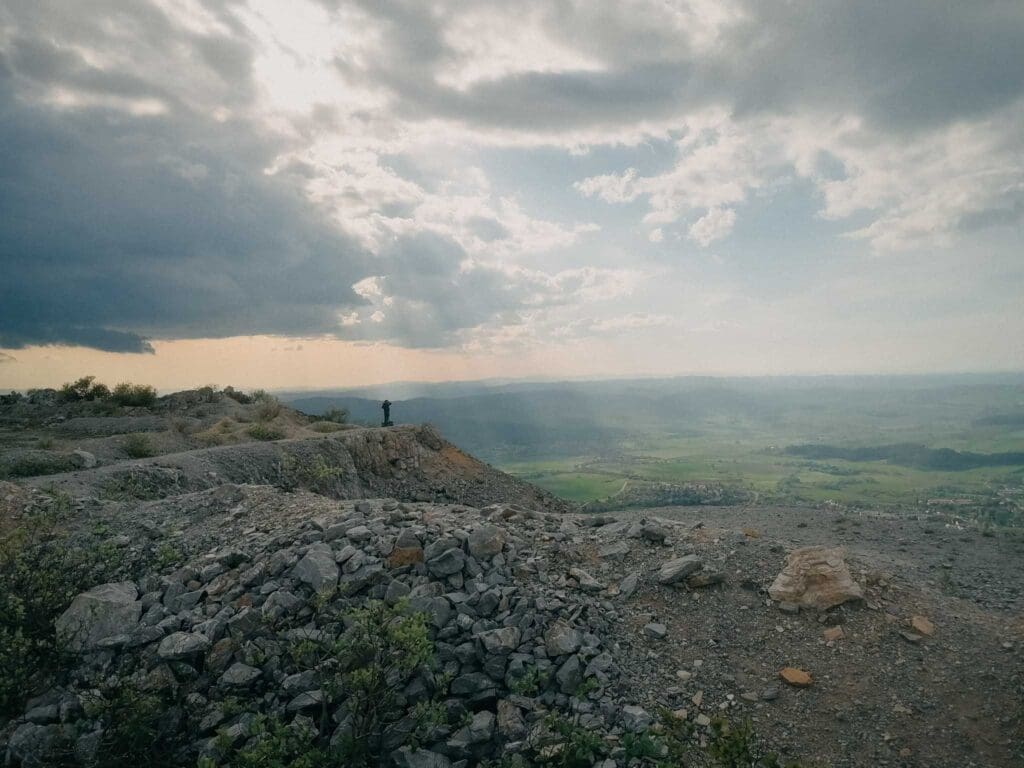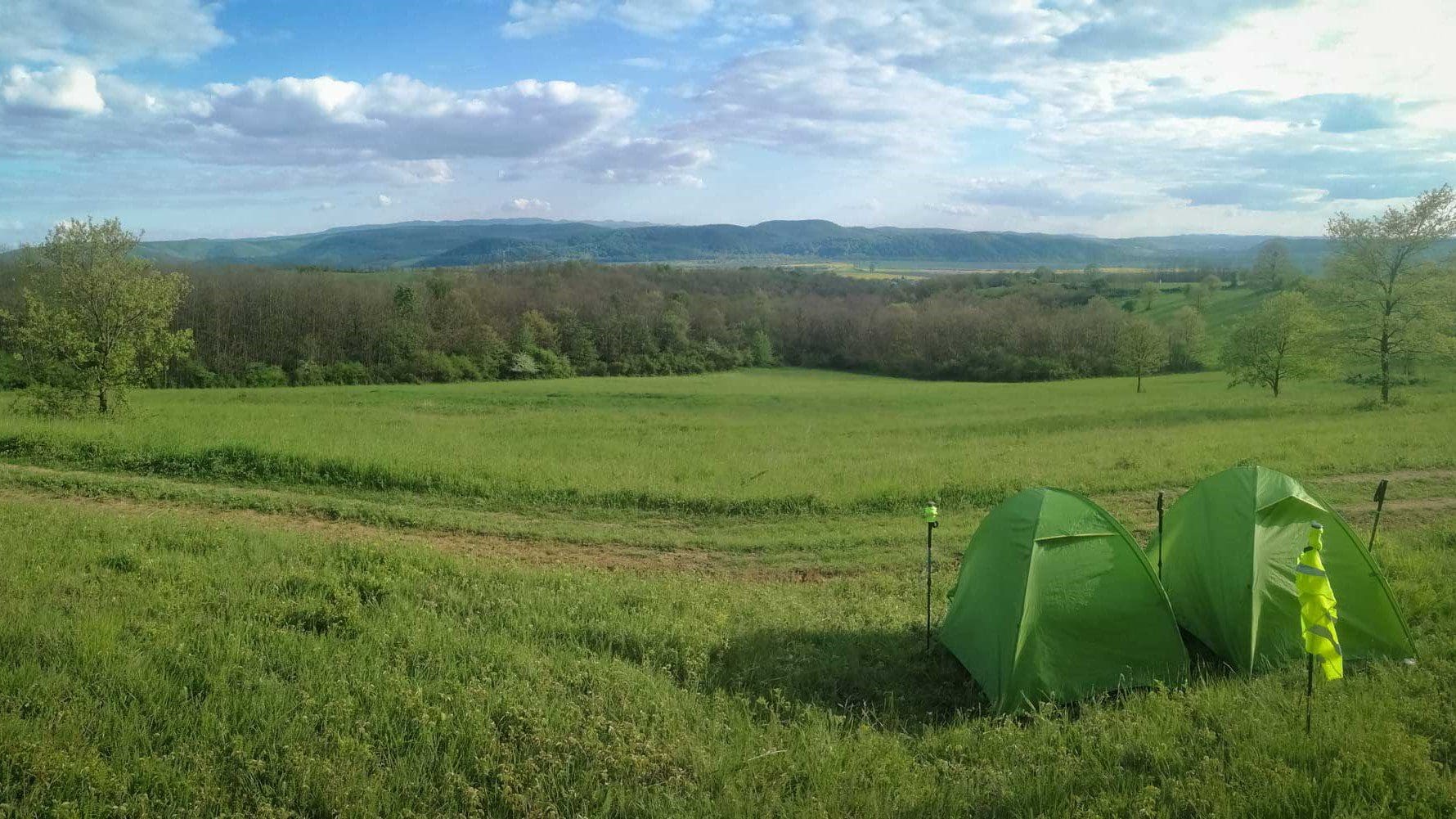The following is a translation of an article written by Emese Hulej, originally published in Magyar Krónika.
1,169 kilometres, fifty days, two twin brothers. Zoltán and László Tátrai completed the National Blue Trail of Hungary at a stretch, with two backpacks and tents, and with as little fuss as possible.
It is night; there are two tents standing in the middle of a field. A wild boar is sniffling nearby, curiously grunting around one of the tents. One of the brothers sleeping inside wakes up and feels the vapour steaming from the animal’s mouth. Not long after, he would go back to sleep, but he suddenly hears a deer hurtling next to him with a great roar.
I did not even ask where exactly all this happened, although Laci, a cartographer by nature, would have surely told me. But he rather remarked that the wild boar was probably more frightened by Zoli’s snoring than Zoli was by the wild boar.
Zoltán Tátrai and László Tátrai recently completed the National Blue Trail of Hungary together, covering almost 1,200 kilometres in fifty days. They left Írottkő, the highest point of the Kőszeg Mountains, on 28 March and arrived at the village of Hollóháza, the eastern end of the Blue Trail, on 18 May. At the end of the trip, they gave a short account of what they had done on Facebook, and they were most surprised by how much enthusiasm their story generated.
Perhaps the great interest was not even directed at them and their performance, but rather at the unattainable dream of many to set aside fifty days of their lives to do something they truly desire. How many of us entertain the idea, but then all that remains is procrastination. Zoli and Laci did not say ‘later’—they said ‘now’.
‘We’ve done a lot of hiking and motorcycling around the country, and we already covered about 300 kilometres of the Blue Trail as well, but we didn’t even seal it back then. We talked a lot about how nice it would be to go through it together at a stretch.
And then the point came when I felt I was ready for it,’
Zoli recounts. ‘I had worked at the same workplace for fourteen years, and Laci at the same place for more than fifteen. We come from a class where people work for everything they have, so after twenty or so years we were pretty burnt out. After a reorganisation at work, I decided I was done—I was leaving the company. Not out of anger, but because I want to live differently. Laci said shortly afterward that he would also join me because he had come to the same decision. Therefore, not after months of preparation, but quickly, three weeks after Laci’s resignation, we started our journey. Neither of us has a family, so it was easier to leave this way,’ he adds.
The twin brothers already had the proper equipment; they just needed to add a couple of additional items. They also had to arrange a few other things, such as defrosting the refrigerator and turning off the water at home, and on 28 March, they were already at Írottkő. They were greeted by close to freezing temperatures and a strong wind, and not long after, there was even snowfall. It was often colder than usual during their journey, but if one has woollen underwear, appropriate footwear, and a suitable jacket, they should not be too worried. The brothers’ woollen garments are from the most popular and affordable sports store and they got their seal of approval even without any brand name behind them. They kept the cold out and absorbed the sweat, wicking moisture easily away, which matters a lot for someone who cannot bathe every day.

‘We had separate tents so that there would be enough space for both of us. We took sleeping bags, mattress toppers, a camping stove, and even an electric moka coffee maker.
It was just the most wonderful thing to open the flap of the tent in the morning,
see the landscape unfolding before our eyes, make coffee, and drink it in total peace,’ Laci recalls.

Laci reveals that they planned to do the first three hundred kilometres at a more relaxed pace so that they could train a bit in the meantime. At first, they walked eighteen to twenty, then later as many as thirty-eight kilometres per day with bags weighing sixteen or seventeen, sometimes even twenty-three kilos.
One day they were making coffee—at the small village of Vértestolna, as Laci records—when a girl crossed the clearing in front of them. They offered her coffee, and the girl sat down next to them and asked where they were going. They thought they would be happy to help her in anything they could.
‘The girl looked somehow familiar, so I looked her up later, and it turned out that she was the first Hungarian to complete the tour from the New Mexico border to Canada, that is, she covered five thousand kilometres in one go. And we wanted to help her…! In a sense, one goes into the forest to run away from people, but such an encounter is a real gift. There is a scene in the movie titled Fight Club where it’s mentioned that when travelling, we get single-serving cream and butter, and we also get single-serving friends we meet along each of our journeys. We got such single-serving friends on our journey as well. In fact, our post on Facebook was also created because they asked us to let them know when we reach our goal…and, of course, also because we have a few gigabytes of information in our heads about journeys with a tent, and we’re happy to share it with others,’ explains Laci. ‘We didn’t want to have a blog, reports, or publicity—we almost did not take pictures of ourselves, but rather the scenery, which we couldn’t get bored of. The selfie above is the only one we took of ourselves. It was not about showing off—we didn’t want to record it all, but rather to experience it,’ he adds.
The two brothers reached their destination without sprains, strains, pinches, or bites, but this was also thanks to the fact that they did not worry about such matters. One of them had a persistent pain in the knee and the other in the shoulder, and Zoli’s phone was even soaked, but all that was not tragic at all for them; Zoli was only sorry about losing the photos he had taken until then.
He remarks: ‘But at least I couldn’t lose myself in watching the news! Unfortunately, I have a tendency to do so, and because domestic public life is so toxic and depressing, what I also expected a bit from the trip was to get to know the country as much as possible at a human pace. If you walk, go into a store, sit down, talk, address others, and are addressed by others, you realise that the country is full of kind, good people. We’ve seen poverty, especially in the eastern parts of the country, but people there were also kind, they greeted us, asked questions, and answered when we asked them. In another small village, Mogyorósbánya, we were also making coffee at a bus stop when an old lady came over to see if we needed anything, even though we couldn’t look very trustworthy at that point. And it went on just like this until we reached the Budapest region. The Blue Trail leads through Hűvösvölgy, a quite wealthy part of the capital, where no one greeted us anymore from the terraces of the two hundred million-forint villas. In that part of the trail, people don’t even say hello to each other when meeting in the forest.’
As Laci recalls, ‘the greetings disappear in settlements with a population of around ten thousand. From then on, the alienation is very palpable—as well as anxiety!
As we passed from one landscape to another and felt the change in topography and vegetation, we could feel the change in anxiety, too.
The only night we spent in a tent and heard cars and sirens was also in Buda, at the Árpád Lookout. We couldn’t wait to go back to the greenery, to the silence. By then, our brains had already switched—of course, at first, it was strange for us, too, to pitch the tent in the middle of a field, but after a while, it was not only good but also natural. Deer, wild boar, birds, stars, open air, and silence.’
However, to say ‘silence’ would be a bit of an exaggeration… One night they were camping next to a stream and even bathed in it. Zoli had already fallen asleep, but Laci could not, and, exceptionally, not because of the snoring coming from the neighbouring tent. ‘There was a bird sitting on a branch above my tent—it had an astonishing voice. I even went outside with my headlamp to look around, but it didn’t stop singing. Of course, I wasn’t the one at home,’ reflects Laci. The boys have only a vague knowledge of birds; even today, they do not know what bird it is whose voice is most reminiscent of a sci-fi parody with a laser gun.
Laci continues by saying: ‘Hungary is a Garden of Eden—wherever we go in nature, we can spend the night in an 8,000 HUF tent in 100 per cent safety. There are no animals dangerous to humans, such as scorpions, poisonous spiders, and so on. It’s true, though, that there was a bear warning in the Bükk Mountains just then, so we even took the food out a hundred meters away from the tent, but no bear came around us. However, we saw many deer, mouflon herds, and different games every day. We saw a deer herd twice—it’s a miracle how they can disappear from the field in an instant.’

In total, they slept fifteen times in a bed—in lodgings or by friends—, but they spent the rest of the nights in their tents. That is enough time for a person to feel that he is also a biological being, that he can be at home in nature, too. Sort of a clumsy metaphor, but it is like the difference between a lion in the zoo and a lion in the wild. The latter lives the way a lion should live, while the other is far from what it was born to be.
We, humans, have also led ourselves into a way of life that makes us ill with its pace, air, food, cramped spaces, and lost silence. These two twin brothers, who were born only five minutes apart,
found their way back to real life.
And now that they are home, they want to stay closer to this lifestyle. Because someone who can walk a thousand kilometres on his own feet through mountains and valleys is also able to walk his own path in another sense.
By the way, these fifty days cost the two of them six hundred thousand forints. In other words, their monthly spending per person was about one hundred and fifty thousand forints, with the heating, electricity, and water off in both of their houses. No one lives large in the forest. In the morning, if possible, they started the day with scrambled eggs, which they stored already beaten. Besides, among others, they always had packet soup and porridge with themselves, and they celebrated their birthdays with noodle soup and an energy bar each. When they felt like it, they stopped for a bite to eat a hearty meal at a restaurant—they usually planned to take half of their portions away for later, but always ended up eating it all. They needed the calories. Similarly, when they had the chance, they did not miss eating a good old traditional lángos, a strudel, or ice cream either. Zoli still lost thirteen, while Laci five kilos.
I also asked if their relationship had changed while they walked across the country from Alpokalja (Hungary’s pre-Alpine region) in the west to the former Zemplén County in the east, but it was good to hear that it had not—they thought it was pretty much perfect before and it remained so after, and they are the same way with their younger sister, too.
The two brothers concluded by saying:
‘We are not only brothers but best friends, partners, sports partners, and colleagues as well.’
Related articles:
Click here to read the original article.







